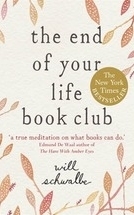More on this book
Community
Kindle Notes & Highlights
You could say that the book club became our life, but it would be more accurate to say that our life became a book club. Maybe it had always been one—and it took Mom’s illness to make us realize that. We didn’t talk much about the club. We talked about the books, and we talked about our lives.
Nancy liked this
He starts to whisper a prayer. “Whatever beings there are, may they be free from suffering. Whatever beings there are, may they be free from enmity. Whatever beings there are, may they be free from hurtfulness. Whatever beings there are, may they be free from ill health. Whatever beings there are, may they be able to protect their own happiness.”
Nancy liked this
This was another lesson I learned from Mom over the course of our book club: Never make assumptions about people. You never know who can and will want to help you until you ask. So you should never assume someone can’t or won’t because of their age, or job, or other interests, or financial situation.
Nancy liked this
Mom said, “Kitty admires the nuns’ courage—but she’s every bit as brave as them, braver. The nuns do what they do without fear; she does what she does in spite of it. I think that’s what her friend means when he quotes from the Tao. And besides, the nuns’ reward is in this life and in the life after. They haven’t been duped at all.”
Nancy liked this
Then she continued: “I have learned from the refugees I have met over the last eighteen years to have hope for the future—and that is what has helped me through my life, and I know that has been important to the Class of 2008. I wish you all that for yourselves, and so much more.”
Nancy liked this
After Mom and I had discussed Home, I joked with my brother that I wished I could be a little more prodigal. He assured me that it wasn’t all it was cracked up to be. He also pointed out to me something I’d missed about the book club: Mom had finally succeeded in getting me to talk about faith and religion and even Bible stories, something she’d been trying to do for years.
Nancy liked this
It’s a section where Kabat-Zinn points out that we all know it’s wrong to interrupt each other. And yet we constantly interrupt ourselves. We do it when we check our emails incessantly—or won’t simply let a phone go to voicemail when we’re doing something we enjoy—or when we don’t think a thought through, but allow our minds to fix on temporary concerns or desires.
Nancy liked this
This, I finally realized, was how Mom was able to focus when I was not. It was how she was able to be present with me, present with the people at a benefit or the hospital. She felt whatever emotions she felt, but feeling was never a useful substitute for doing, and she never let the former get in the way of the latter. If anything, she used her emotions to motivate her and help her concentrate. The emphasis for her was always on doing what needed to be done. I had to learn this lesson while she was still there to teach me.
Nancy liked this
How can you be lonely, Mom said, when there are always people who want to share their stories with you, to tell you about their lives and families and dreams and plans? But now she couldn’t stop thinking about David Rohde and how lonely he must be, separated from his wife, from his books, and, she feared, from anyone who wanted to share their stories with him or hear his.
Nancy liked this
What I suddenly understood was that a thank-you note isn’t the price you pay for receiving a gift, as so many children think it is, a kind of minimum tribute or toll, but an opportunity to count your blessings. And gratitude isn’t what you give in exchange for something; it’s what you feel when you are blessed—blessed to have family and friends who care about you, and who want to see you happy. Hence the joy from thanking.
Nancy liked this
The latter therapy has its roots in a philosophy called Naikan, developed by Ishin Yoshimoto. Naikan reminds people to be grateful for everything. If you are sitting in a chair, you need to realize that someone made that chair, and someone sold it, and someone delivered it—and you are the beneficiary of all that. Just because they didn’t do it especially for you doesn’t mean you aren’t blessed to be using it and enjoying it. The idea is that if you practice the Naikan part of Constructive Living, life becomes a series of small miracles, and you may start to notice everything that goes right in
...more
Nancy liked this
“We all owe everyone for everything that happens in our lives. But it’s not owing like a debt to one person—it’s really that we owe everyone for everything. Our whole lives can change in an instant—so each person who keeps that from happening, no matter how small a role they play, is also responsible for all of it. Just by giving friendship and love, you keep the people around you from giving up—and each expression of friendship or love may be the one that makes all the difference.”
Nancy liked this


